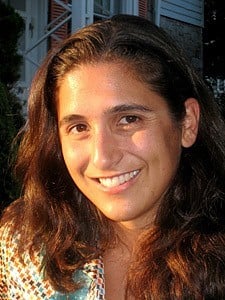In Parshat Beha’alotcha, the desert Israelites are hungry again. This time, they are ravenous for the savory leek, onion and garlic; the refreshing cucumber and melon; and, above all, for the flesh that they remember from Egypt. Consumed by their famishment, the people cry out to Moses: “Now our soul is dried away; there is nothing at all.”[1]
Moses cannot abide this last wail of desiccation and—brittle now himself—he cracks. He takes on the people’s sensation of withering, mirroring it in his own anguished plaint to God:
Did I conceive all this people? Did I birth them that You should say to me: Carry them in your breast, as a nursing-father carries the suckling child, unto the land, which You swore their fathers?
Pointedly, Moses then addresses the Divine as “aht”—the feminine “you”—begging the Lord to kill him if he alone is to carry the people, now “too heavy” to bear. From a desperate place, Moses is appealing to God as one mother beseeching another.[2]
God responds tenderly to Moses, instructing him to gather 70 elders with whom to “share the burden of the people,” so that he “shall not bear it alone.” But with respect to the Israelites’ cravings, the Divine anger is inflamed, and God vows to give the people meat until it “becomes loathsome.” God is enraged that the Israelites “have rejected the Lord who is b’kirbichem”—among them.[3]
Shockingly, the overwhelmed, sapped Moses—whose strength, Rashi comments, has “waned like that of a woman” [4]—snaps back:
The people, among whom I am, number 600,000 men; yet You say, “I will give them enough meat to eat for a whole month.” Could enough flocks and herds be slaughtered to suffice them?[5]
Moses seems to challenge whether God truly understands the magnitude of the people’s need. He throws the Divine’s own language back at God, retorting that with respect to those 600,000 men—“anochi b’kirbo”—“I am among them.” It is Moses—and by implication not God—who is among them, who must bear the people’s seething hunger. The leader who had just begged the Lord to kill him, has been reinvigorated, it would seem, by the furious want of his starving, suckling nation.
As he struggles to respond to the nation’s never-sated hunger, Moses’s casting of himself in the feminine is uncomfortably fitting. Then, and now, it is predominantly women who provide, prepare and deliver nourishment to their families. And it is women, therefore, who stand on hunger’s front lines. The UN’s World Food Programme (WFP) estimates that 80 percent of farmers in Africa and 60 percent in Asia are women.[6] And it is, of course, only women who nourish the very young with their own milk—who must pause from hard labor in the fields, paddies and orchards to nurse the insistent babies swaddled to their backs.
Women’s consumption and nutrition, however, is rarely commensurate with their labor. As one agricultural specialist explained: “It doesn’t matter whether it’s a humanitarian crisis or an economic crisis or a food price crisis, women are hardest hit. . . .[A woman] feeds her husband, and then she feeds her children, and then she feeds herself if there’s anything left.”[7] At the heartbreakingly-common extremes, women waste away as they deny their own needs to provide for children and men.[8]This denial is borne out on a massive scale, with women and girls making up seven out of ten of the world’s hungry.[9]
It is essential to recognize, however, that intimacy with want can incubate its own kind of power. The WFP insists that “women are the first and fastest solution to reducing hunger and poverty,” in no small part because “in the hands of women, food is far more likely to reach the mouths of needy children.”[10] And, critically, women are increasingly joining together to harness their intimate knowledge of need to combat hunger in their own communities and families.[11]
Efforts like these call into question Rashi’s reading of Moses’s use of the feminine in our parshah. Contrary to Rashi’s commentary, I would proffer that Moses’s invocation of the feminine does not reflect weakness, but ferocity—the powerful ferocity of a mother with dry breasts and a starving child. It is this ferocity that allows Moses to rebuke God and insist that it is he, and not the Divine, who is intimate with the people’s want, who knows the contours of their deprivation—who is truly among them.
We should take heart from Moses’s ferocity. It is this same ferocity that can empower women to rebuke the hunger that stalks their families. It is this same ferocity that can embolden women to band together and banish hunger—so that it will be plenty, and not want, which ultimately resides among them.
[1] Numbers 11:4-6.
[2] Numbers 11:12, 15.
[3] Numbers 11:16-20.
[4] Rashi, Numbers 11:15.
[5] Numbers 11:21-22.
[6] World Food Programme, “Our Work: Focus On Women.” http://www.wfp.org/focus-on-women.
[7] AP, “Women Bear Brunt of African Hunger Crisis,” 26 April. 2009. http://www.msnbc.msn.com/id/30412356/.
[8] Ibid.; Chorghade, G.P., et al., “Why are rural Indian women so thin?,” 9 Public Health Nutrition, 2006. http://dx.doi.org/10.1079/PHN2005762.
[9] ActionAid, “Food – The Facts.” http://www.actionaid.org/main.aspx?PageID=845.
[10] World Food Programme, “Our Work: Focus On Women.” http://www.wfp.org/focus-on-women.
[11] Women for Women International, “Women-Only Agribusiness Fights Hunger and Poverty in Sudan.” 9 December 2008. http://www.womenforwomen.org/news-women-for-women/sudan-cifi-launch-press-release.php.

